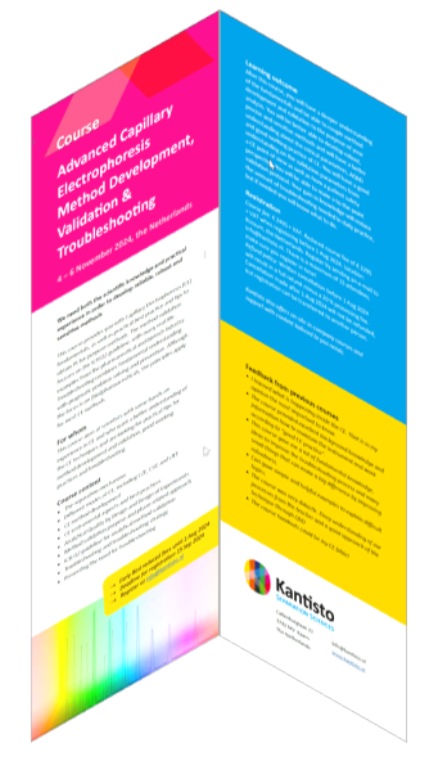Register now for our 3-day course in 2025
3-5 November | Early-Bird fee: €2295 + VAT* | Course fee: €2495 + VAT
The upcoming course is scheduled to take place in the Netherlands in November 2025. For more information and registration, contact Kantisto. There is a maximum of 20 attendees, make sure you register in time! Registration closes one month prior to the course start date. Please send an e-mail to This email address is being protected from spambots. You need JavaScript enabled to view it. or use Kantisto's contact form.
Kantisto also offers on-site consultancy, implementation support, and courses with content tailored to your needs.
* Contact us now to take advantage of the early bird discount and secure a reduced fee! Early-Bird offer applies up to 3 months prior to the course start date. 
Advanced CE method development, validation, and troubleshooting
This course provides you with Capillary Electrophoresis (CE) fundamentals and operating modes, as well as practical tips to obtain fit-for-purpose methods. The method validation focuses on the ICH Q2 guideline, with many real-life examples from the pharmaceutical and biotech industry. Troubleshooting combines fundamental understanding with pragmatic problem solving and prevention. Although the focus is on (bio)pharmaceuticals, the principles apply for most CE methods.
See brochure.
For whom
This course aims at scientists with some hands-on experience in CE and who want a better understanding of the CE techniques and are looking for practical tips for method development and validation, good working practices and troubleshooting.
Learning outcome
After this course, you will have a deeper understanding of the fundamentals and be able to couple method development and validation to the purpose of your analysis. You will be better able to develop robust, precise and sensitive methods and will have a better understanding about the critical parameters, AQbD and good working practice of CE. You will have a good understanding on the validation parameters from a CE point of view as well as from a patient safety perspective. You will be able to make a to-the-point validation protocol. Your gain in knowledge will reduce the amount of troubleshooting needed in daily practice, but if needed you will know what to do.
Course content
- The separation mechanism
- Different modes of CE, including CZE, CGE and cIEF
- CE method development
- CE instrumental aspects and Good Working Practices
- Analytical Quality by Design and Design of Experiments
- Method validation purpose and phase-related approach
- ICH Q2 guideline for analytical method validation
- Troubleshooting strategy
- Preventing the need for troubleshooting
Feedback from previous courses.

